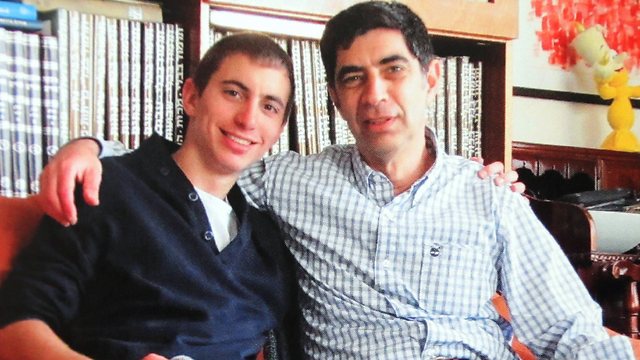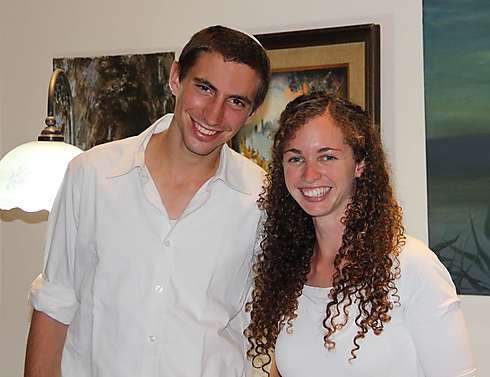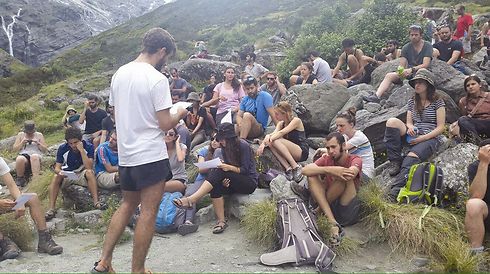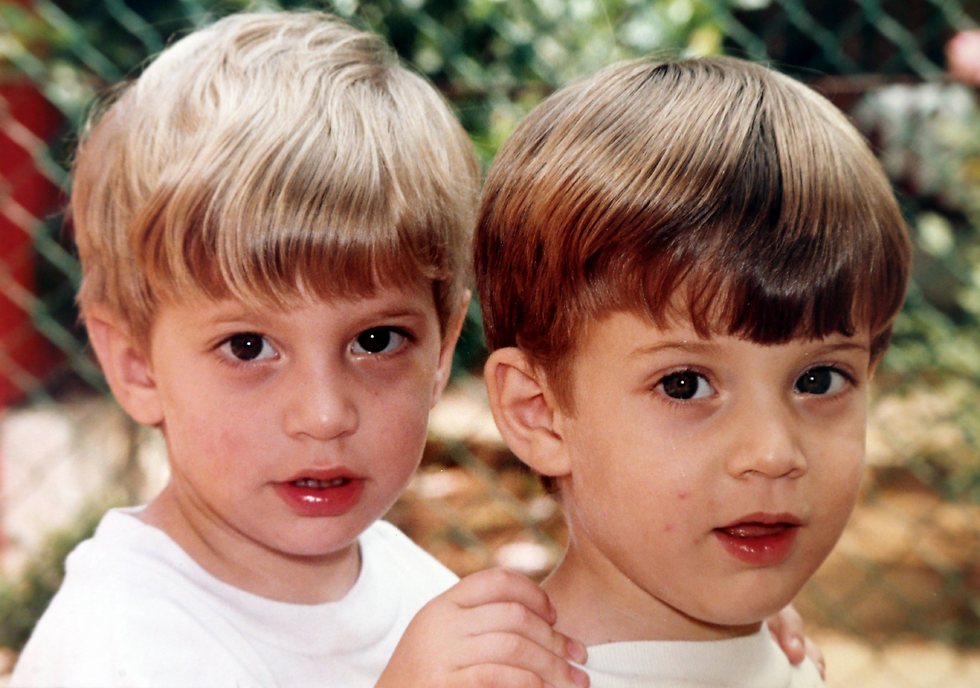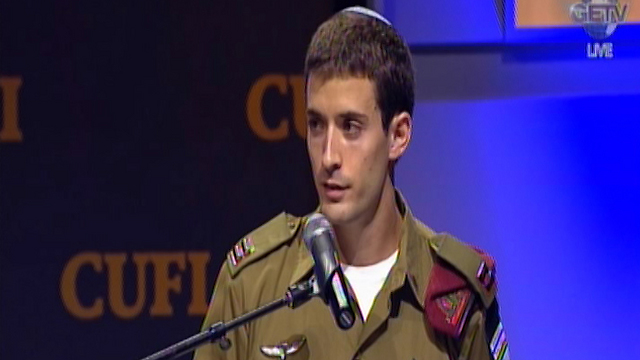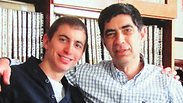
Everyone asks me what I miss the most.
The piercing longing comes when I think of the talks we used to have, and the fact that there won't be any more. When you started a conversation with Hadar, any conversation, you never knew where it would end up. That's how it was when he was a kid, when he was a teenager, and when he grew up. He could take a subject, develop it, change it, parody it, and turn it into a philosophy. That’s what I miss.
Moreover, he was the only one who liked espresso like me. Coffee is supposed to be drunk as it was born: black and bitter, not dressed up with sugar or milk. When you wrap your hand around the cup, it radiates warmth and fragrance.
Only he and I would share this, usually across the kitchen table. Hadar would spread out on the table, get as close to the person he was talking with as he could, gazing at you with his soft eyes, his laugh lines, his furrowed brow. And conversations about espresso—I can't replace those.
I remember talking to him before Passover in 2014. He was looking for a book to buy for his girlfriend, Edna, who later became his fiancée. He connected with our family's tradition of each child getting a book before Passover, Rosh Hashana, and their birthday. He told me that he wanted to buy her the book Heart of Darkness, by Joseph Conrad, and told me in amazement that the translation done by Yair Lapid and his mother, Shulamit, used a Hebrew word in the title for extreme darkness, a word that doesn't exist in English.
Hadar was an obsessive reader in both English and Hebrew. He himself read Heart of Darkness in English at a young age, and returned to read it again and again.
The prophet Jeremiah had an expression to differentiate dark and more than dark. Everyone who has read Conrad knows that the remotest, darkest place in a journey is inside of you—and the Hebrew translation for "Heart of Darkness" mystified and pleased Hadar. He couldn't understand how they could have changed the name, so he didn't buy the book, and he asked me to help him look for the older translation.
He then began to talk about the names of the protagonists and the connections between the names and the characters. I tried to tell him that there have already been thousands of commentaries on Kurtz and the meaning his name conveys, but he had already gone off on a tangent about the other protagonists, pondering the meanings of their names and came to a conclusion which Conrad scholars never arrived at. Hadar began to draw comparisons between Jacob, his journey and his name change and the journeys of Kurtz and Marlow.
For hours now I've been trying to remember the rest of this conversation, but I don’t remember any more of it because I sinned the parents' sin, taking my son for granted. I enjoyed the coffee and the conversation, but I had other things on my mind, and I knew that the conversations would continue the next day or at some other time.
There is one memory that's gotten hold of me and won't let me go. Ten years ago, we were living in Cambridge for the year, and on a Saturday evening, our good friends Peter and Diana Lipton came to visit. Peter was the head of the Department of Philosophy of Science at the Cambridge, a brilliant and young scholar in his field, and a wonderful man. When he came in, he saw Heart of Darkness open on a bookstand, and began to talk to me about Conrad's works. I told him that I was more than happy to talk to him about Conrad, but that it was actually Hadar reading the book, and not me.
Peter loved to discuss complex philosophical concepts with kids and teenagers, and he excitedly turned to Hadar and started talking with him about the book. It was amazing to watch this discussion between a world-renowned philosophy professor and a 14-year-old teenager on Conrad. At the end of the discussion, Peter turned to me and said, "You've raised a very interesting young man; it will be a pleasure to talk with him more when he grows up."
Peter Lipton died suddenly a year later, and I've been sad ever since that those two weren't able to meet "when he grows up" to continue talking about Conrad and Kurtz. Maybe now they're sitting together, one with a cup of tea and the other with an espresso, and are continuing the conversation. Maybe Hadar is explaining to him why the Patriarch Jacob's journey reminds him of Marlow's journey, and how the name Kurtz is connected to the way Jacob became Israel.
Everyone asks me how we still have hope and how we remain optimistic.
I look at the pictures of Tzur (Hadar's twin brother) and his friends on their New Zealand trip, and it fills me with hope. Three months ago, Tzur and his friends went on their big post-army trip: the Fellowship of the Ring. Seven discharged officers, friends of both Hadar and Tzur. Maglan and Rimon, Givati and the Armored Corps, Intelligence and Submarines. A Fellowship of a Ring from all branches of the Army.
Hadar loved Tolkien. Bilbo, Frodo, Sam, and Aragorn were in his soul. He read The Hobbit and Lord of the Rings again and again, so much so that the binding disintegrated and the pages started falling out. Then the movies, with their gorgeous landscapes came out. The whole family watched them together, we saw all of the views, and we talked about New Zealand.
Tzur and his friends fulfilled Hadar's dream, and they did it full force, and Hadar was there. They started their trip, and everywhere they went, they left a note saying "For the smiles—We invite everyone to join in a special trip in memory of Lieutenant Hadar Goldin. The trip will begin on Thursday, February 4, on the Rob Roy track in the Matukituki Valley. The meeting point will be at the parking lot of the track at 10:30. The trek will last four hours, and will finish at Wanka Lake. Bring guitars and harmonicas. Can't wait to see you." One hundred fifty people showed up. Hadar was there.
They took pictures, they made videos, everything! They put the clip on YouTube:
When you watch it, ask yourself some questions: how were they able to create such a warm bond that 150 young people came to go on a hike in memory of their fallen friend? Look at the pictures and ask yourself, were these young hikers religious or secular? Were the Sephardi or Ashkenazi? Were they rich or poor? It's impossible to know! That’s how they realized Hadar's dream; over a hundred people without differences, without rifts.
What did this group want? That we won't forget that we left Hadar in the hands of the enemy. That we'll remember him and his smile. We are united in our desire to remember, united in the demand to bring a friend, a colleague, to be buried in Israel. Bring him back from the hands of the enemy. Therefore, I'm full of hope. I trust in this generation—in Hadar's generation. Tzur and his friends understand the issues and know what they want. They will come back and mend the rifts: they will deal with the problems and will carry Hadar's words: "There are no difficulties and no problems—only challenges."
That’s what Hadar wrote when he was a commander for the special-forces unit of Givati in March 2014: "A second soldier has a completely different story. He told me that he doesn't want to be a combat soldier. He thought that basic training would be a fun challenge, but understood that it requires more than the minimum amount of effort. At the moment, he has been completely turned off to the idea of being in the unit, and he prefers not be in combat in order to invest in developing his civilian life. He doesn't come from a family which supports his joining this unit; they define themselves as 'leftist atheists,' and even his girlfriend doesn't want him to be in combat.
"I took him aside for a private conversation, and I went through all the issues that he had brought up. In short, I told him that this isn't about waving a flag and singing the national anthem; it's about walking shoulder to shoulder, not on a training mission, but while going into Gaza, as Kassams are falling on his friends' houses. I told him about the meaning of being a member of my squad and about the warrior's spirit. I told him that the truth about myself and the other squad commander: we'd been serving together for a long time, but we have political opinions that are 180 degrees different from each other, but it hasn't stopped us from spooning each other for the past two years when we're out in the field, from loving each other and working with each other. This is what is beautiful in the army – that you meet people in an open space."
That was Hadar, those are his words, and that's just how he was killed, "marching shoulder to shoulder on their way to Gaza as Kassams are falling on your friends' houses."
Everyone asks me if we visit the Gaza area.
The nickname "Gaza envelope"(a name used to refer to the region of Israel surrounding the Gaza strip) boils my blood. This area isn't the "Gaza envelope;" it's the "Israel envelope," and we should refer to it as such. Of course we visit this area, which our son fell to protect and whose remains were kidnapped by Hamas. As difficult as it is, we visit the area, and every time I go, the memories wash over me anew.
On July 29, 2014, the 2nd of the Hebrew month of Av, I got a message saying that the unit left the Strip for a break. I got my military uniform on, put on my ranks, and went to the south. It's about 75 minutes from Kfar Saba to the Ma'on junction, and onto route 232. I drove quickly on the empty roads and kept the radio off so that I could hear if there was a siren, and called everyone I could on the front to know where the unit was.
At Ma'on junction, the military police had closed the road and refused entry to any civilian vehicle. You had to show ID to prove that they were a resident of one of the communities in the area. The military police argued with tired eyes with "residents" who wanted to travel on the southern road, even though all night mortars and rockets were falling in the region. A police officer opened the roadblock for me, and I asked the officer "Where's the Givati reconnaissance platoon?" He told me to continue and ask at the Nir Yitshak roadblock.
I found the entire unit in the fields outside Nir Yitzhak. They were in the staging area, resting, showering, changing clothes. That's where I met Hadar and his smile. I didn’t know it, but it would be the last time.
Around us, the pomegranates were ripening from green to red, and I thought about the place where Hadar was planning to hold his wedding, which we visited the week before.
Hadar was drawing what he wanted to be in the invitation for his wedding: birds and pomegranates, a house with him and Edna inside, all in the staging area. He sent the picture in a Whatsapp message.
After Hadar's death, we received the original. In the staging area, before going into Gaza, an officer was drawing his wedding invitations on the back of an equipment list. Songbirds flying away from the bombed out warzone, and the pomegranates. The same pomegranates that were ripening from dark green to bright red.
A week ago, my wife and I were invited to visit the Eshkol Regional Council. A year and seven months before, we stood at the same intersection. It was impossible to cross it. Trucks were going up and down the road, an infinite number, turning left at Ma'on junction, going to route 232. The person who was standing next to us said, "Those trucks have gravel, those trucks have cement, and those have commodities." Right… commodities…
These trucks were bringing gravel and cement into Gaza. All driving past the communities which suffered so much a year and seven months ago: Ein Hashlosha, Nirim, Nir Oz, Magen, Ein HaBesor, Nir Yitzhak.
We were guests at Nofei Habesor, which, at least according to the sign at the entrance, was a schoolhouse. We passed through the gate and entered what looked like heaven. Sweeping lawns, classrooms scattered among the flower beds and green trees. Children from kibbutzes and moshavs were being educated together, sitting in groups in the gardens. It was wonderful.
"We made a school, turned it into a garden, created special programs, exciting combinations, a dedicated teaching staff," they told us. "We are also the first school to be completely fortified! We covered everything in concrete to defend against terror attacks." Heaven with concrete.
North of the fortified schoolhouse, an unending line of trucks filled with cement and gravel and "commodities" heading to Gaza. The children sit in groups in the gardens, ready to run into the nearest shelter within 15 seconds whenever our enemies decide to shoot another rocket, Qassam, or mortar at them.
Afterwards we went to the agricultural fields that are south of the kibbutzim. We passed through the wheat fields—wheat the likes of which I had never seen before in my life. Green, strong.
"What is this? We’re in the Negev, correct?" I asked the security coordinator. "Yes," he said, "I haven't ever seen wheat like this. A lot of rain fell this year."
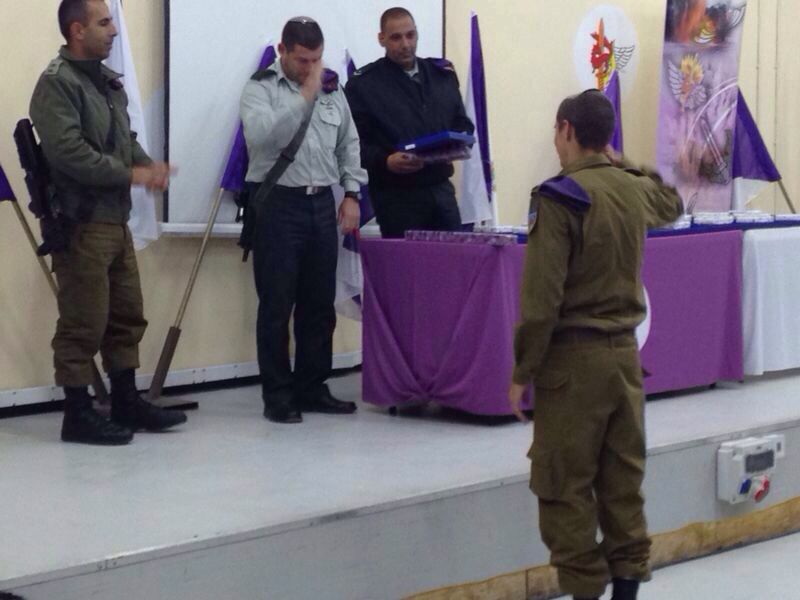
The car stopped, and we got out onto the path. The security pointed to the south.
"That’s Absan, and after that is Khan Yunis."
I thought again about the wheat next to us, the ready enemy south of us, and the busy road north of us. An infinite convoy bringing cement, gravel, and "commodities" to Absan and Khan Yunis.
Everyone asks me if I believe in the government.
I believe in courageous leadership. From within the leadership, we choose a government. The government governs and leads us, and the people choose the leaders. We are a people who decided that our army, the IDF, will be a people's army. That means the values of the people command the leadership and its practices. This is a core value, in which I believe.
On the night of June 8, 1978, Lt. Col. Amnon Lipkin-Shahak, the then-commander of the Paratroopers Battalion, refused an order under fire. Paratroopers were raiding a terrorist outpost. That was where the terrorists who attacked Israeli citizens at the Savoy Hotel and on the Coastal Road trained. When our forces started bombarding the buildings near the outpost, two of our paratroopers, Saran Nir Zahavi and Saran Yiftach Ayin, were killed, and their bodies were trapped inside a home. The commander of the operation, Brig. Gen. Matan Vilnai, commanded the missile boat operation in the sea, received a warning of terrorists approaching the sector. He explicitly ordered the troops to retreat without the bodies of the soldiers.
However, Lipkin-Shahak ordered them not to retreat without the officers' bodies. The soldiers cleared the rubble, reached the bodies, and returned them to Israel for burial. Among these troops were a number of special-force paratroopers commanded by Moshe Ya'alon, who was a major at that time. I assume that Lipkin-Shahak thought about this decision 26 years later, when he served as IDF chief of staff.
On May 11, 2004, the Givati Brigade entered the Zeitoun neighborhood of Gaza to carry out an operation. In a fight, two armored personnel carriers (APC) were hit, and one of them was completely destroyed. The Palestinian Islamic Jihad then seized the remains of the soldiers and the armored personnel carriers. Brig. Gen. Shmuel Zakai, the then-commander of the Gaza Division, ordered his troops to raid the Gaza neighborhood and return all the remains to Israel. The risk was that until they returned the bodies, the forces would not be able to leave the neighborhood, and large bulldozers would start destroying it. That is what the IDF did. Dozens of terrorists were killed, and bulldozers indeed began tearing apart homes. As a result, the Islamic Jihad transferred the bodies to the Red Cross.
The following day, while IDF forces continued their fight to retrieve the bodies, an APC was blown up near the Philadelphia Corridor. The response was immediate. IDF bulldozers erected mounds of dirt from which forces made advances to retrieve the fallen soldiers' bodies. Other forces destroyed homes that were firing at the APCs and rescue force. In the operation, the IDF destroyed over 100 houses. Two of our troops were killed, one by a sniper's shot and another while retrieving one of the bodies.
These are the real values of the IDF. These are the values that I was brought up on and that I brought my kids up on. There is an absolute consensus in the army that soldiers who go into battle come home with the wounded and the fallen.
The leadership of the State of Israel today is comprised of people who fought everywhere and defended the State. They know that in battle, the commander returns to his base with his living soldiers carrying the injured and fallen on their shoulders. We do not leave anyone behind in the battlefield. This principle stands close to and far away from home. IDF forces went to Entebbe to return the body of Yoni Netanyahu to Israel. I am sure that Israel would have done that at any cost or potential risk.
In Operation Protective Edge, the IDF left two bodies in Gaza and Rafah. On the 9th of Av, Col. Ofer Winter, the commander of the Givati Brigade, came directly from the battlefield in Gaza to speak with me about his excellent officer, Hadar, who was killed and kidnapped on the outskirts of Rafah. He told me that he did everything that his orders allowed to retrieve Hadar's body so that he could be buried in Israel. I saw in his eyes everything that remained unsaid. He also told me that he was certain that the IDF would do everything to bring Hadar for burial in Israel.
Today we are waging a war of values. Our values are those of life, and the values of the enemy, Hamas are those of death. We must not become confused and we must not give up, because sticking to our principles is what will bring victory. Preserving those principles is valor, but giving them up is cowardice. We are the valorous, and we will not surrender to cowardice. We are the people of freedom and will not surrender to those we want to stop us.
For a generation, we paid a heavy price for our slain soldiers held by the enemy, and now we are tasked with flipping the equation. Israel’s leadership must set the price the enemy will pay for not returning slain IDF soldiers to their country. Israeli society will support the leadership, which, with courage and determination, will clarify to the enemy how heavy a price it will pay for damaging our values. This must be a guiding principle in any course of action regarding the enemy, in any territory and in every area.
For example, our values that establish the humanitarian way to treat an enemy will also decide the price the enemy will pay for anti-humanitarian behavior. Every parent knows today that Hamas’s goal is to kidnap soldiers and hold their bodies. Every soldier at every border understands this, every soldier’s mother understands this, and every reservist understands this. So do the doctors treating sick people from Gaza, and the truck drivers passing the towns that were mortared on southern roads, bringing “humanitarian gestures” to Gaza. A humanitarian gesture must be dependent on humanitarian behavior. Otherwise, it rewards anti-humanitarian behavior. Our enemies who hold slain IDF soldiers continue their efforts to kidnap and murder because of the backwinds given by the humanitarian gestures given with no conditions.
There is a trust between the soldiers and their commanders; there is an eternal covenant between parents and the county’s leadership. The thousands of soldiers know and wait, the mothers know and wait, and the fathers know and wait.
The standards of our values determine that we must bring Lt. Hadar Goldin of the Givati Brigade and Staff Sergeant Oron Shaul of the Golani Brigade to be buried in Israel. Only a brave leadership will bring Hadar and Oron to be buried in Israel. We will do this Hadar’s way, with courage and humility. We will do so in the name of our values, unyielding and undeterred, in the name of valor, in the name of liberty, in the name of light.
Everyone asks me how I go on.
This is what his brother Chemi wrote at the end of the shloshim (30 days of mourning): “Hadar was born on Adar 4, 5751, to the Goldin family, which then lived in a mixed religious and secular town, Eshhar. Hadar came into a world with an older sister, Ayelet, and an older brother, Chemi, and waited outside the womb for five minutes until his twin brother Tzur joined him. It was the final days of the First Gulf War, and the twins overjoyed the family on Purim when the war ended. Since then, Hadar, together with his twin brother, grew up and brought light to the family and the world. Together, they won the hearts of teachers, learned to play music together, paint and sculpt, went to Bnei Akiva together and grew from protégés to instructors, went to pre-military academy together, and finished an officers’ course together, and raised a new generation of soldiers.
“With the end of the operation to search for the kidnapped teenagers, Hadar decided the time had come to cheer up the family and those who live in this country, and so he announced that he was proposing to Edna. The family celebrated the engagement and planned a wedding. Hadar went to battle and did not return. Hadar was killed during a ceasefire, in an operation meant to locate tunnels whose goal is to exterminate the towns in the south. His body was snatched and is held by Hamas. Hadar, in his smile, in his drawings, in his writings and in the hearts of his family, his protégés, and his soldiers, left his testament waving the flag of love of humanity. Hadar did not allow his soldiers to curse, helped the needy, and tried with all his might to connect with those who live in this country, so different from one another and so similar, religious and secular as one.”
This is the young man whom we left in Gaza, and this is the young man to whom we are obligated to give a Jewish burial in Israel. Therefore, when everybody asks how I go on, I respond with something that Hadar always said: "You have two options in life: focus on yourself, or do great things."













